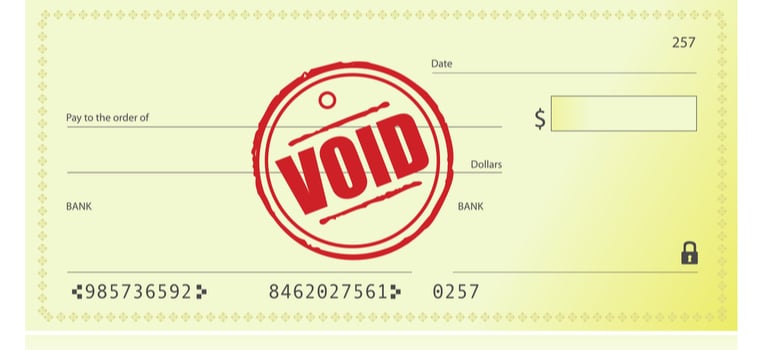There are a number of reasons why you might want to cancel a check. Two major reasons to cancel a check is if you misplace a check you’ve signed, it’s been stolen, or it was lost in the mail. You also may have used a check to pay for goods or services that were not delivered as promised. You may not have enough in your account to cover the check.
As long as a check has not been cashed, you can request a stop payment order from your bank. You will need to make the request before the check is cashed, you will need complete information on the check, and you will pay a fee.
How a Stop Payment Order Works
When you sign a check to someone, they can cash it at a bank, credit union or other institution. Once the check is cashed, the funds will be drawn from your checking account.
If you have issued a check but the money has not yet been drawn from your account, you can still cancel the check by requesting a stop payment order. The check will not be honored when it is presented.
This leaves a limited time window for canceling a check. Most checks are cashed within 2-3 business days. Only the account holder can request a stop payment order, and a fee will be imposed depending on the bank.
Only personal checks can be canceled. It may not be possible to cancel a cashier’s check unless you can show that it was lost or stolen.
How to Request a Stop Payment Order
There are several steps involved in canceling a check:
Find out whether the check has been cashed. Once the check is cashed it will show up on your bank balance as a withdrawal. Check your online banking ledger or contact your bank to determine if the check has been cashed.
Collect complete information on the check. When you’re ready to cancel the check, the bank will need details about that check to cancel it, including:
- Your account number.
- The check number.
- The exact amount of the check.
- The date the check was issued.
- The name of the person or business the check was issued to.
- The person who signed the check, if it’s a joint account.
- The reason for the stop payment order.
Contact your bank. You can request a stop payment order by phone, but you may also be asked to file a written request. Be sure to ask what the fee will be. If you are stopping payment because your funds are insufficient, you may find that the stop payment fee is higher than the overdraft fee. You could let the check go through, especially if you will have the funds to cover it soon.
Make a note of the stop payment order’s expiration date. Most stop payment orders are good for six months. Banks will generally not accept a check that’s more than six months old, but you can renew the order for another six months.
If you stop payment on a check because you are not satisfied with a transaction or because the account does not have enough funds to cover the check, contact the payee and discuss the situation. Paying for goods with a check and then stopping payment could be considered check fraud.
If Checks Are Lost or Stolen
If a check or a group of checks is lost or stolen, you may not have to pay a fee to have the checks canceled. Ask your bank. If your bank charges a per-check fee for canceling stolen checks, you may be better off closing the account and opening a new one.
You may need to report the theft or loss to the police and submit a copy of the report as evidence that the check or checks were lost or stolen. If a check was stolen or lost in the mail you may need to file a report with the US Postal Investigation Service. Your personal information may have been compromised, so you should take precautions against identity theft.
If a stolen or lost check has been deposited or cashed, you are the victim of a crime. You cannot stop payment, but you may be able to recover the funds. Report the incident to the police and your bank.
Always secure your checks. If you are mailing a check, consider using registered mail so that the check can be traced if necessary.
Conclusion
As long as a check has not been deposited or cashed, you can cancel it by requesting a stop payment order. You will have to act quickly to have the order in place and you will pay a substantial fee.
If possible, avoid the need for canceled checks by keeping your checks secure and only issuing a check when you are sure the payment is legitimate.
If a check that you sent to pay a bill was lost, contact the intended recipient, advise them of the situation, and arrange another form of payment. If your original check arrives late, they will need to know that the check is no longer valid.





